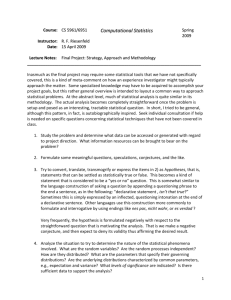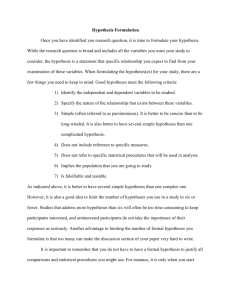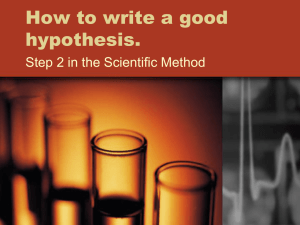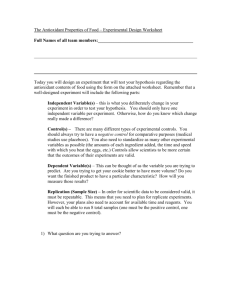Reading Notes Litosseliti Text Chapter 1
advertisement
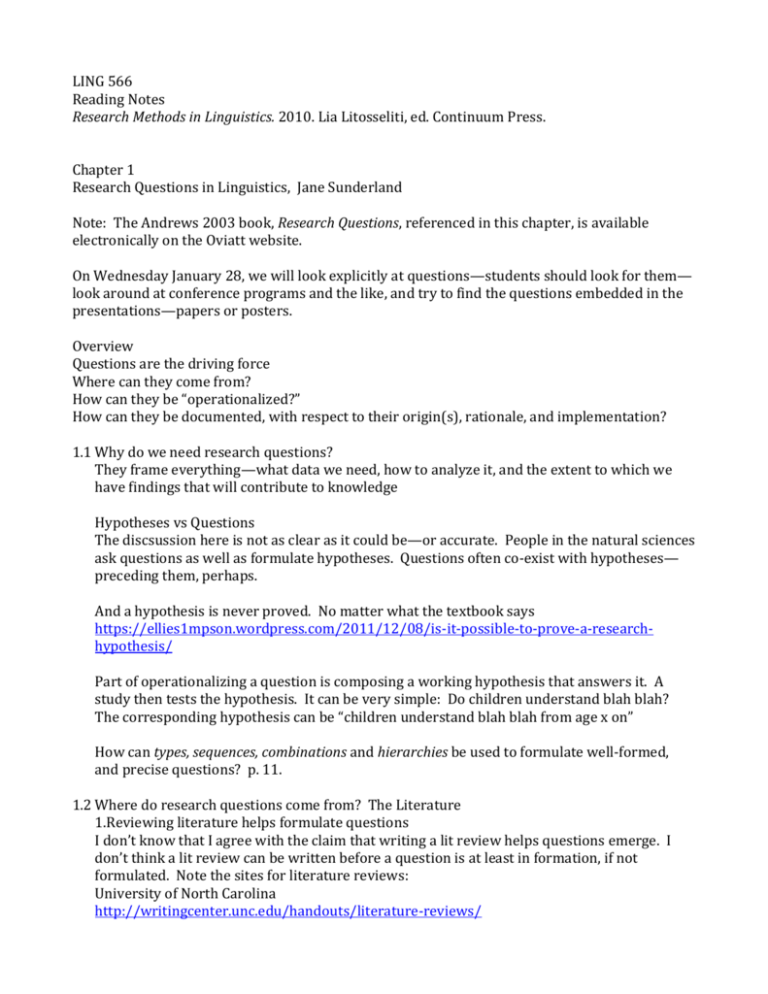
LING 566 Reading Notes Research Methods in Linguistics. 2010. Lia Litosseliti, ed. Continuum Press. Chapter 1 Research Questions in Linguistics, Jane Sunderland Note: The Andrews 2003 book, Research Questions, referenced in this chapter, is available electronically on the Oviatt website. On Wednesday January 28, we will look explicitly at questions—students should look for them— look around at conference programs and the like, and try to find the questions embedded in the presentations—papers or posters. Overview Questions are the driving force Where can they come from? How can they be “operationalized?” How can they be documented, with respect to their origin(s), rationale, and implementation? 1.1 Why do we need research questions? They frame everything—what data we need, how to analyze it, and the extent to which we have findings that will contribute to knowledge Hypotheses vs Questions The discsussion here is not as clear as it could be—or accurate. People in the natural sciences ask questions as well as formulate hypotheses. Questions often co-exist with hypotheses— preceding them, perhaps. And a hypothesis is never proved. No matter what the textbook says https://ellies1mpson.wordpress.com/2011/12/08/is-it-possible-to-prove-a-researchhypothesis/ Part of operationalizing a question is composing a working hypothesis that answers it. A study then tests the hypothesis. It can be very simple: Do children understand blah blah? The corresponding hypothesis can be “children understand blah blah from age x on” How can types, sequences, combinations and hierarchies be used to formulate well-formed, and precise questions? p. 11. 1.2 Where do research questions come from? The Literature 1.Reviewing literature helps formulate questions I don’t know that I agree with the claim that writing a lit review helps questions emerge. I don’t think a lit review can be written before a question is at least in formation, if not formulated. Note the sites for literature reviews: University of North Carolina http://writingcenter.unc.edu/handouts/literature-reviews/ UNPC (University of North Carolina at Pembroke) http://www2.uncp.edu/home/acurtis/Courses/ResourcesForCourses/LitReview.html 2.A pre-existing topic that a new event or new context (a new language to look at the phenomenon in) highlights or provides a new perspective for 3.An unanswered question of your own—from previous research (“and this came up as an issue/question/possibility for an account; but is it?”) 4. Hypothesis testing (often quantitative) and hypothesis generating (often qualitative, e.g. diary studies in the book) 1.3 Research Questions, topics and Puzzles They are not topics; they are interrogatives, but they grow out of topics (and the reverse can happen as well). “Intellectual puzzles…” “Why is it that…..?” “What if…?” “Informed hunches” “I wonder if (who, what, why)…?” 1.4 Types of Research Questions Interrogatives: Descriptive: how/what/when/where Descriptive but less contentful: Is/Are/Do/Does Explanatory: why Evaluative questions: What’s the best method? Author feels these are not well-placed as questions. Evaluation can take place in the discussion of a research piece. Other ways to categorize questions: Primary/Secondary Contributory/Main (first provides a path to the second—does ‘x’ happen? Then, why or why not? Overarching/subordinate How are political events described/presented—how many passives? How are actors in news stories presented? Empirical/methodological/theoretical Researcher generated (can participants generate questions? What about fieldwork?) Are you doing research about, on with or for your participants? Empirical/speculative 1.5 How many research questions? Not too many to confuse the territory. 1.6 Research Questions and Linguistic Data Cohen, et al. The library has the 2000 edition LB1028.C572 2000 Wodak, R. and Chilton, P A new agenda in critical discourse analysis. Library has electronically. 1.7 Operationalizing the Questions—putting them to work and figuring out how to go about answering them. Note wording: what are their reasons vs what reasons do they give. The latter is better. Why? 1.8 Implications of research questions for data, data collection and analysis – i.e., for the methodology of the project. What do you need to do to find an answer, to test a hypothesis, to describe a phenomenon in sufficient detail? What does it mean to say (p. 24) “’why’ questions have to handled with a great deal of caution and ‘answers’ expressed in a way that is neither overstated nor reductionist.” ? What is reductionism? 1.9 Documenting the decisions that are part of the project Research Question (the kind of) Data Needed 1. 2. Would you add anything else? What (if anything)? (the method(s) of) Data Collection (Method(s) of) Data Analysis



